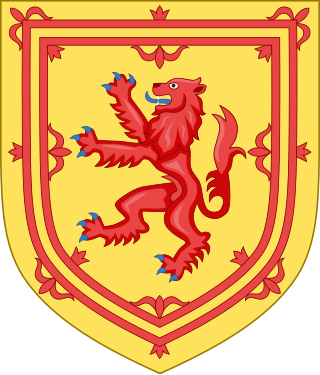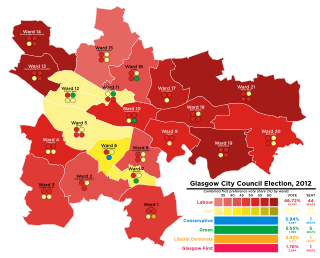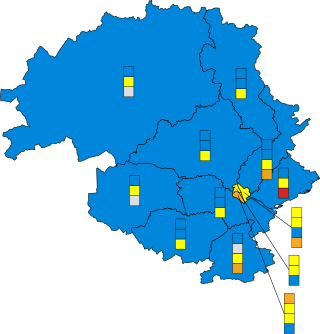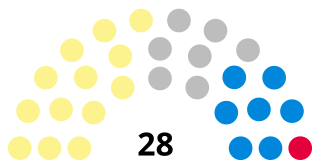
Ochil and South Perthshire is a county constituency of the House of Commons of the Parliament of the United Kingdom. It elects one Member of Parliament (MP) by the first-past-the-post system of election.

Scotland has elections to several bodies: the Scottish Parliament, the United Kingdom Parliament, local councils and community councils. Before the United Kingdom left the European Union, Scotland elected members to the European Parliament.

Elections to Glasgow City Council were held on 3 May 2007, the same day as the other Scottish local government elections and the Scottish Parliament general election. The election was the first one using 21 new wards created as a result of the Local Governance (Scotland) Act 2004, each ward elected three or four councillors using the single transferable vote system form of proportional representation. The new wards replaced 79 single-member wards which used the plurality system of election. It also saw the election of Glasgow's first councillors for the Scottish Greens and for Solidarity.

The 2007 Aberdeen City Council election took place on 3 May 2007 to elect members of Aberdeen City Council, at the same time as the Scottish Parliament general election. The election was the first one using 13 new wards created as a result of the Local Governance (Scotland) Act 2004, with each ward electing three or four councillors using the single transferable vote system a form of proportional representation. The new wards replaced 43 single-member wards, which used the plurality system of election.
Elections to North Lanarkshire Council were held on 3 May 2007, the same day as the other Scottish local government elections and the Scottish Parliament general election. The election was the first one using 20 new wards created as a result of the Local Governance (Scotland) Act 2004, each ward will elect three or four councillors using the single transferable vote system a form of proportional representation. The new wards replace 70 single-member wards which used the plurality system of election.
Elections to Falkirk Council were held on 3 May 2007—the same day as the Scottish Parliament general election. The election was the first one using 9 new wards created as a result of the Local Governance (Scotland) Act 2004. Each ward will elect three or four councillors using the single transferable vote system form of proportional representation. The new wards replace 32 single-member wards which used the plurality system of election.

Elections to Aberdeenshire Council were held on 3 May 2007 the same day as the other Scottish local government elections and the Scottish Parliament general election. The election was the first one using 19 new wards created as a result of the Local Governance (Scotland) Act 2004, each ward would elect three or four councillors using the single transferable vote system form of proportional representation. The new wards replaced 68 single-member wards which used the plurality system of election.
Elections to the Highland Council were held on 3 May 2007; the same day as elections to the Scottish Parliament and to the 31 other councils in Scotland. Previous elections to the council had been conducted using the single member plurality system. Changes implemented by the Local Governance (Scotland) Act 2004 meant that future local government elections were to be conducted using the Single Transferable Vote, beginning with those in 2007. The 80 Highland Councillors were now to be elected from 22 wards, returning either three or four members.
Elections to Argyll and Bute Council were held on 3 May 2007 the same day as the other Scottish local government elections and the Scottish Parliament general election. The election was the first one using 11 new wards created as a result of the Local Governance (Scotland) Act 2004, each ward will elect three or four councillors using the single transferable vote system form of proportional representation. The new wards replace 36 single-member wards which used the plurality system of election.

The 2012 Scottish local elections were held on 3 May 2012 in all 32 local authorities. The Scottish National Party (SNP) overtook Labour to win the highest share of the vote, and retained and strengthened its position as the party with most councillors. Labour also made gains, while the Liberal Democrats experienced meltdown, losing over half their seats and falling behind the Conservatives. For the first time since the introduction of the Single Transferable Vote system, the SNP won majority control of 2 councils, from no overall control. Labour also won majority control of 2 councils from no overall control, while retaining majority control over 2 councils.

Elections to Angus Council were held on 3 May 2012 the same day as the other Scottish local government elections. The election used the eight wards, created as a result of the Local Governance (Scotland) Act 2004, with each ward electing three or four councillors using the single transferable vote system form of proportional representation, with 29 Councillors being elected.

Elections to Comhairle nan Eilean Siar (Western Isles Council) were held on 3 May 2012, the same day as the other Scottish local government elections. The election was the second one using the 9 wards created as a result of the Local Governance (Scotland) Act 2004. Each ward elected three or four Councillors using the single transferable vote system: a form of proportional representation. A total of 31 Councillors were elected.

Elections to Glasgow City Council were held on 3 May 2012, the same day as the other Scottish local government elections. The election was the second using 21 new wards created as a result of the Local Governance (Scotland) Act 2004, each ward elected three or four councillors using the single transferable vote system form of proportional representation.
Elections to Argyll and Bute Council were held on 3 May 2012 on the same day as the 31 other local authorities in Scotland. The election used the eleven wards created under the Local Governance (Scotland) Act 2004, with 36 councillors being elected. Each ward elected either 3 or 4 members, using the STV electoral system.

Anderston/City/Yorkhill is one of the 23 wards of Glasgow City Council. Created as Anderston/City in 2007, it returned four council members, using the single transferable vote system. The same criteria applied in 2012. For the 2017 Glasgow City Council election, the boundaries were changed, the ward slightly decreased in size and was renamed Anderston/City/Yorkhill, still returning four councillors.

Elections to Fife Council were held on 4 May 2017, the same day as the other Scottish local government elections. The election used the 22 wards created as a result of the Local Government Commission for Scotland's 5th review which was published in September 2016, with each ward electing three or four councillors using the single transferable vote system form of proportional representation, with 75 councillors elected; a decrease of three seats from 2012 as one ward, The Lochs, was abolished.
The 2017 Midlothian Council election took place on 4 May 2017 to elect members of Midlothian Council. The election used the six wards created as a result of the Local Governance (Scotland) Act 2004, with each ward electing three Councillors using the single transferable vote system form of proportional representation, with 18 Councillors being elected.

Elections to Stirling Council were held on 4 May 2017, the same day as the 31 other local authorities in Scotland. The election used the seven wards created under the Local Governance (Scotland) Act 2004, with 23 councillors being elected, an increase of 1 from 2012. Each ward elected either 3 or 4 members, using the STV electoral system. Following the Fifth Electoral Review by the Local Government Boundary Commission for Scotland, minor changes were made to several of the ward boundaries and one additional Councillor was added moving the total number of Councillors from twenty-two to twenty-three.

Elections to Perth and Kinross Council were held on 4 May 2017, the same day as the other Scottish local government elections. The election covered the twelve wards created as a result of the Local Governance (Scotland) Act 2004, with each ward electing three or four councillors using the single transferable vote system form of proportional representation, with 40 Councillors being elected, a reduction of 1 member compared to 2012.

2022 Elections to Angus Council took place on 5 May 2022, the same day as the 31 other Scottish local government elections. As with other Scottish council elections, it was held using single transferable vote (STV) – a form of proportional representation – in which multiple candidates are elected in each ward and voters rank candidates in order of preference.













